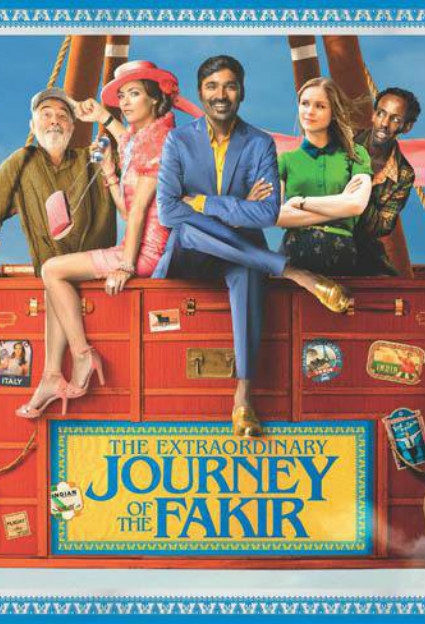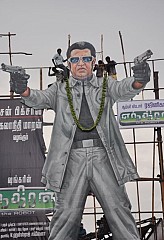

“Are we poor?” asks a stubborn boy to his mother in the teaser of the movie, The Extraordinary Journey of The Fakir. The seething anger under his tone is replaced with a comforting smile when his mother replies with a confirming “No”. But, the stewing emotion in the boy’s tone triggered a memory in the early 2000s, from those wretched years of one’s adolescence. Like all the lower middle-class boys with scars of unrequited love, burning wounds of relentless bullying and a ragged sack weighed heavy with unrealised dreams of fair complexion, strong muscles, thick moustache and beard, expensive bikes, trending apparels, exotic body sprays, and lovely girlfriends to roam around with, and you were searching for a true cult figure onscreen to identify with and vent out the frustrations.
The miracle happened when Vinod, the psychopath protagonist (or antagonist?) of the 2003 movie, Kaadhal Kondein, let go of the hands of the heroine with a wry smile on his lips, and disappeared into the unknown depths of a valley. A generation of alienated and sidelined young men found their messiah in Dhanush, who shouldered their shattered dreams and stolen desires and avenged for them with that iconic wry smile to the entire hostile society. The soil was set for the ascension earlier in 2002 when his filmmaker father Kasthuri Raja launched a reluctant Dhanush as a hero in the adolescent mash-up, Thulluvadho Ilamai.
Very few actors in the history of Tamil cinema had such a polarising and divisive acting debut as Dhanush. The actor was virtually lynched in the discussion forums for his lack of conventional heroic traits. Moreover, his first two characters encompassed a mountain full of hatred, distrust, inferiority complex and insecurity; the character traits marked most of his characters after that. These very same deplorable characteristics of his onscreen avatars earned him a cult following among adolescent and young moviegoers, who were haunted by equally deplorable personal demons. However, it requires more than that to survive for a kid from a cinema family in the highly competitive film industry.
Dhanush needed a breakaway success to stabilise his wobbling market, and after picking the wrong scripts at the wrong time a few times, he found his place in the Tamil cinema pantheon with hits like Selvaraghavan’s Pudhupettai and Vetrimaraan’s Polladhavan. While Pudhupettai earned him the confidence of the filmmakers as an actor who can shoulder heavyweight roles, Polladhavan was his ace on the table of commercial potboilers. There are very few examples in Tamil cinema like the climactic duel, between Dhanush’s Prabhu and Daniel Balaji’s Ravi, for an actor overcomes all the limitations of his physique and convinces the viewers he can pull off the situation.
Similarly, in various scenes portraying the rise and fall of the gangster Kokki Kumar in Pudhupettai, Dhanush delivers a volcanic savagery through his eyes and body language. The genre experimented, and the evolving process of the actor culminated in Vetrimaaran’s magnum opus, Aadukalam in 2011. With the milestone movie, Dhanush found his niche among viewers and zeroed in on a comfort zone between high voltage drama and stark subtlety. This axial point enabled him to overcome his inconspicuous physical attributes and deliver balanced, measured acting that works with all types of audience.
In a closer look, most of his characters are dwelling on the verge of madness, chronic dissatisfaction, frustration, and resulting savagery. They do terrible things to themselves and those who around them without any clichéd tools in cinema to evoke sympathy for the anti-hero like solid justifications. Their meagre existence in the massively consumerist society itself is a justification for their emotional and physical turbulence. Their suppressed anger and stolen dreams are the only assets they can hold onto in a predatory, loveless world. Interestingly, Dhanush kept his balancing point and played it safe when crossed over to Bollywood.
After 18 years of a turbulent journey of rises and falls has seasoned the actor in him. The demons lurked in the eyes of his characters are almost tamed for a measured deliverance of emotions. The stolen generation who grew up with him has also matured enough to accommodate the loveless ways of the world. Stories of hunger, lust, power, survival, ambitions, and dreams are still waiting to be told through him. But, there is one thing that remains unchanged. It is the brotherhood sealed with blood when Vinod smiled wryly at Divya, when Kokki Kumar’s maddening monologue pierced the walls of the lock-up, when Karappu sang and danced out his eternal love, and when Kolaveri shook the social media platform all over the world with its Tanglish beats.
Very rarely we meet an actor who can play with the unpredictability hidden within us, to show what the inner demons can do to us, and those around us, with immaculate genuinity. In an interview with critic Baradwaj Rangan, Dhanush explains his acting technique as, “I was not raised to be an actor. So I don’t know any technique. The only technique I know is to believe. Believe that, I am that part.” And, in the recently released trailer of Dhanush’s English language debut, The Extraordinary Journey of The Fakir, he asks a fellow character, “Are you all illegal immigrants?” “And you are not?” asks one of his co-passengers in reply. “No, I am a tourist,” replies Dhanush’s character. “A tourist? Travelling in a wardrobe?” quipped the other man. In some way or another, his characters have been doing that to us; to reassure when we feel like illegal immigrants in this world by making us believe we are the tourists, and for that, we will love him forever.
Behindwoods is not responsible for the views of columnists.

OTHER LATEST BEHINDWOODS COLUMNS
RAGESH DIPU'S OTHER COLUMNS
- The attacks and assaults on actresses, or should we say, women
- A question at the time of the theatre shutdown: Why are we going to the movies?
- From Anbe Sivam to Velaikkaran - How Tamil Cinema dealt with consumerism
- How Malayalam and Tamil cinemas exchanged actors
- The Many Lives of Fahadh Faasil
- The Suriya body shaming incident - Are you sure you have not done it too?



